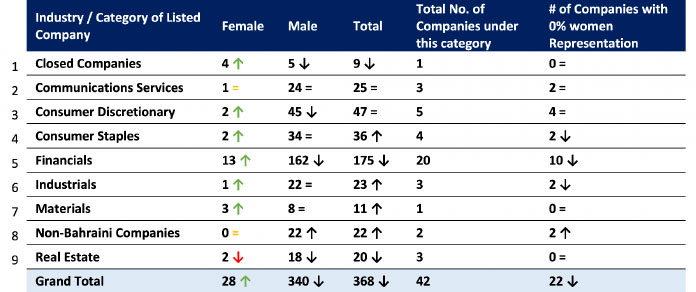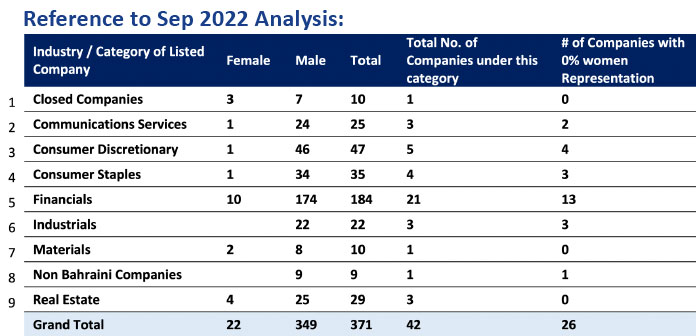Chartered Manager, Eman Deabil (DipESG, PfMP, IPMO-P, SIP), explored the representation of women in the boardroom in Bahrain listed companies in 2022. This month, she explores the growth of this representation from 5.9 percent to 7.6 percent over the last two years.
In 2022, we examined women representation in the boardroom of the listed companies in Bahrain. The percentage of representation at the time was 5.9 percent.
 In Bahrain we have 42 publicly listed companies on Bahrain Bourse spanning over nine categories (information for which can be found on the official Bahrain Bourse website). An analysis was conducted by looking at the Board of Directors of each company and the following conclusion was drawn:
In Bahrain we have 42 publicly listed companies on Bahrain Bourse spanning over nine categories (information for which can be found on the official Bahrain Bourse website). An analysis was conducted by looking at the Board of Directors of each company and the following conclusion was drawn:
From the above, we can observe that 28 of the total 368 board seats are attributed to women, which represents 7.6 percent, whereas 340 are attributed to men, which represents 92.4 percent.
 Out of the 43 companies, 22 companies (around 50 percent) have no women representation (0 percent) meaning that these 22 listed companies have all-male boards.
Out of the 43 companies, 22 companies (around 50 percent) have no women representation (0 percent) meaning that these 22 listed companies have all-male boards.
From the table above, we can see that there is a positive progress on the women representation front with an increase in percentage from 5.9 percent to 7.6 percent. This progress is primarily driven by the following factors:
More Women Directors: The number of women holding board positions rose from 22 to 28, representing a gain of six seats.
Decrease in Men Directors: The number of men holding board positions decreased from 349 to 340.
Slight Decrease in Board Seats: The total number of board seats across all companies decreased from 371 to 368.
Despite male directors still holding the majority of board chairmanships (41 out of 42), a positive development sees one listed company now led by a female chairperson.
Unlike what we observed in 2022, “over-boarding” was limited to male directors in the listed companies, this time, there is one female who is sitting in two boards. Some male directors on the contrary are serving in up to six boards – which is beyond the limits set in the Corporate Governance Code (2018) of Bahrain that states the following under Principle 1:
“8. No director may have directorship of more than five (5) Public Joint Stock Companies in the Kingdom of Bahrain, provided that no conflict of interest may exist. The Board may not propose the election or re-election of any director who participates in more than five companies’ BoDs.”
Around 16 directors hold doctoral degrees (based on name prefixes), including two women. While high academic degrees can be an asset, a balanced and well-rounded board requires directors with diverse qualifications and experience who bring real value.
This year, a trend has emerged (based on observations of family names); several directors appear to be passing their board seats to their sons. This practice raises significant concerns about board independence, expertise, fairness, diversity, inclusion, and equal opportunity. Notably, this practice seems to be exclusive to male directors.
While the increase in women directors on boards in Bahrain is encouraging, significant work remains to achieve gender parity. Addressing over-boarding, promoting diverse qualifications on boards, and tackling other issues highlighted are crucial for fostering strong corporate governance practices.







